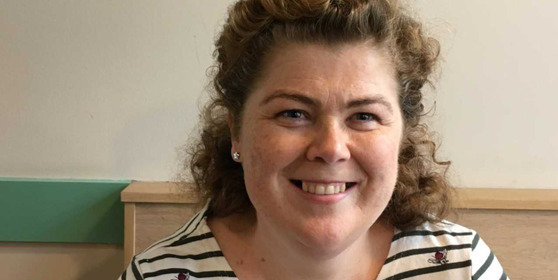'I thought I could have died, it happened suddenly' – mum (46) suffers severe asthma attack while out shopping

Andrea Rowsome was browsing in a health food shop with her husband when suddenly she was overcome with a sudden breathlessness. As she attempted to gasp for air, she grew dizzier and dizzier. She thought she might faint and she couldn’t tell her concerned husband what was happening
The shop assistant scrambled to find her a chair, while her husband raced to get their car which was parked minutes away. All the while, Andrea sat in the health food shop, trying to grab puffs of her blue Ventolin inhaler.
The 46-year-old mother from Bray was suffering a severe asthma attack. She’d had mild asthma throughout her life. And what she thought was a cold and a chest infection in December 2016, was actually an extreme form of asthma with an accompanying, incurable severe cough. It took ten puffs until she could at least catch her breath once more.
Andrea spent the following eight days in hospital, and had a month-long recovery at home.
Severe uncontrolled asthma is a form of the condition where its difficult to ascertain situations that will trigger the person’s asthma.
Now, Andrea is on a daily regimen of four different preventative inhalers, a nasally-administered steroid, antihistamines, antibiotics and daily oral steroids.
“I actually thought I could have died then because it came on very, very quickly… I went into A&E and they put me on a big dose of steroids which is the normal course when you have an attack, but it wasn’t really helping.”
“I’m on the maximum dose for all of my medications,” Andrea says, “and the objective of them all is to become symptom-free. But I’m not symptom-free, and they can’t increase the dosage any further, so I have to work with what I have and manage the condition as much as possible with the assistance of my consultant.”
Andrea’s own grandfather died during an asthma attack, so she is acutely aware of the seriousness of her illness.
Everyday, seemingly innocuous, things can spark a coughing fit. The smell of scented candles and cleaning products, the frozen mist from supermarket freezers, or even when she raises her arms over her head.
“You can’t plan for the triggers,” Andrea explains, “but you can prepare for and work around them. The nature of my condition means that I can’t do many outdoor activities, such as walking in certain weathers or environments, but I try and keep active indoors – line dancing is a particular hobby of mine.”
Ireland has the fourth highest prevalence of asthma in the world with an estimated 470,000 people in the country living with the condition.
One person dies from an asthma-related illness every week here, and asthma also accounts for around 20,000 emergency department attendances and 5,000 hospital, according to the Asthma Society of Ireland.
“People think asthma is a little bit of a wheeze,” Andrea explains. “But now I know it’s an emergency. I hadn’t been well over Christmas and I didn’t go to the hospital, I learned from Dr Butler that really I should have gone in to hospital.”
“Asthma is treated as a medical emergency, it’s not treated as a sore foot or arm.”
But she added: “I’m a bit less worried now because I’ve more education behind me; an asthma nurse has gone through everything with me; Dr Butler has a plan in place for me – a green, yellow and red.
“When I go into yellow, I know my coughing has increased, and when I go into a red, I know what I’ve to do immediately. I know when it’s a ‘don’t hang around and wait’. We’ve a plan in place in the house as well, there’s an emergency bag for the hospital as well; in it will always be my ventillator and my emergency plan. I’m also more inclined to go to hospital and to see the GP if I need it.”
For now, Andrea is taking it one day at a time, minimising all risks that could cause flare-ups, and dedicating as much time as she has to her family. Genomics Medicine Ireland is currently conducting a genomic research study into asthma and Asthma-COPD Overlap (ACO), the first of its kind in the world.
Genomics involves the study of a person’s whole genome – that is, their entire set of DNA and other non-coding elements of their genes (such as RNA), and studying this data alongside participants’ clinical phenotype, background and lifestyle factors, provide a more complete picture for genetic research.
Andrea’s brothers also suffer with asthma, and so the Bray native is hopeful that eventually asthma can be eradicated.
“My dad didn’t have asthma at all. His father would have had asthma and died of an asthma attack, he had emphysema as well, but he died from an attack. He was only in his 40s.”
Source: Read Full Article